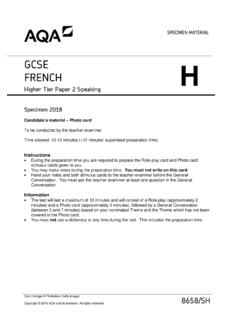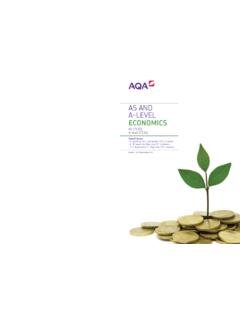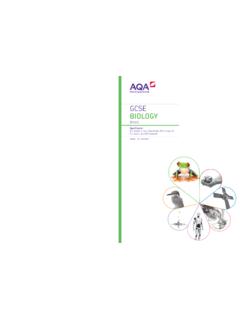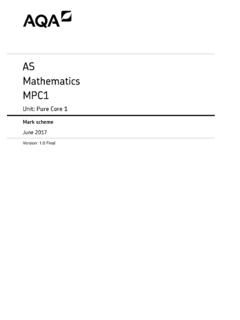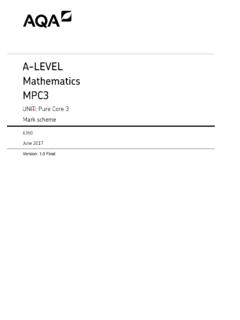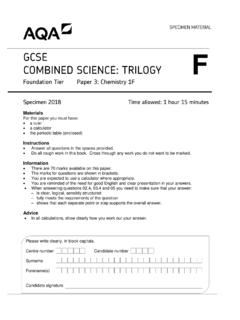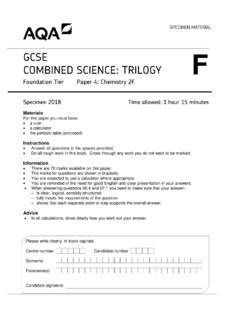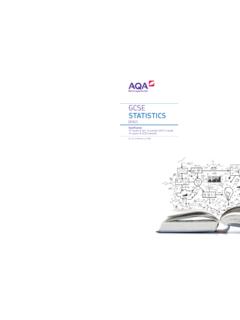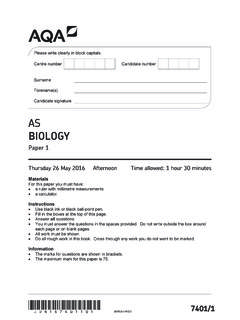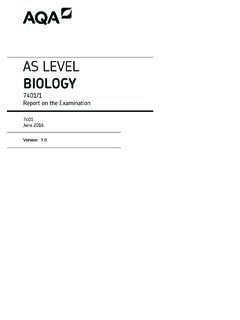Transcription of A-level SOCIOLOGY (7192/2)
1 SPECIMEN MATERIAL A-level SOCIOLOGY (7192/2) Paper 2 Topics in SOCIOLOGY Specimen 2015 Morning Time allowed: 2 hours Materials For this paper you must have: An AQA 16-page answer book. Instructions Use black ink or black ball-point pen. Write the information required on the front of your answer book. The Paper Reference is 7192/2. Answer all questions from one topic in Section A and all questions from one topic in Section B. Do all rough work in your answer book. Cross through any work you do not want to be marked. Information The marks for questions are shown in brackets. The maximum mark for this paper is 80. Questions should be answered in continuous prose. You will be marked on your ability to: use good English organise information clearly use specialist vocabulary where appropriate. 2 Section A Choose one topic and answer all the questions on that topic.
2 Topic A1 Culture and Identity Outline and explain two ways in which individuals may be socialised into a social class identity. [10 marks] Read Item A below and answer the question that follows. Item A One of the features of the world today is a global culture in which there is increasing interconnectedness between people living in different parts of the world. Technology has allowed people to exchange ideas and information at a rapid and expanding rate. Sociologists have pointed out that this global culture has both positive and negative impacts on the culture of people in the UK. applying material from Item A, analyse two ways in which global culture affects the culture of people in the UK. [10 marks] Read Item B below and answer the question that follows. Item B The postmodern view is that we have freedom of choice over our leisure activities. We are free to choose who we want to be and our choice of leisure helps to create our identity.
3 Whatever our class, age, gender or ethnicity, we can become whoever we want to be through our leisure and consumption choices. applying material from Item B and your knowledge, evaluate the view that our leisure and consumption choices are the most important factors in shaping our identity. [20 marks] 0 1 0 2 0 3 3 Turn over Topic A2 Families and Households Outline and explain two ways in which women's involvement in paid work has affected family structures. [10 marks] Read Item A below and answer the question that follows. Item A Parents today spend a great deal of time and money trying to mak e sure that their children enjoy a comfortable upbringing. They want their children to have opportunities that they themselves never had. March of progress sociologists argue that these changes in family life have led to an improvement in the position of children in society.
4 applying material from Item A, analyse two changes in the position of children in society over the last 100 years. [10 marks] Read Item B below and answer the question that follows. Item B Some sociologists argue that changes within the family and in wider society have led to more equality in modern family life. The way in which domestic tasks are allocated is more equal and both partners are likely to be in paid employment. This sharing of responsibilities has led to more equal power relationships. applying material from Item B and your knowledge, evaluate the view that the division of labour and power relationships in couples are equal in modern family life. [20 marks] Turn over for the next Topic 0 6 0 4 0 5 4 Topic A3 Health Outline and explain two differences between the social and biomedical models of health and illness in their understanding of mental illness.
5 [10 marks] Read Item A below and answer the question that follows. Item A Working-class people make less use of health care services in relation to their level of ill-health than do middle-class people. For example, middle-class patients have longer consultations with their GP. One study showed that they are more likely to be referred for hospital tests for heart disease. Similarly, there are class differences in the use of preventative care such as vaccinations and dental check-ups. applying material from Item A, analyse two reasons for social class differences in the use of health care provision. [10 marks] Read Item B below and answer the question that follows. Item B Doctors present themselves as acting in the interests of their patients and wider society in the fight against disease and suffering. However, according to conflict sociologists, doctors serve the interests of powerful groups such as the pharmaceutical industry and the capitalist class as a whole.
6 They also protect their own self-interest as highly privileged, well-paid professionals. applying material from Item B and your knowledge, evaluate the view that the medical profession serves the interests of powerful groups in society. [20 marks] 0 7 0 8 0 9 5 Turn over Topic A4 Work, Poverty and Welfare Outline and explain two reasons why members of certain minority ethnic groups may be more likely to be unemployed than others. [10 marks] Read Item A below and answer the question that follows. Item A There is now a range of welfare services for those in need. These include services provided by the state and funded largely from taxation, such as the National Health Service (NHS). They also include services provided by private and voluntary organisations. Some sociologists argue that state provision is more effective than that provided by private and voluntary organisations.
7 applying material from Item A, analyse two reasons why welfare services provided by the state may be more effective than those provided by private and voluntary organisations. [10 marks] Read Item B below and answer the question that follows. Item B For some sociologists, technological change is often associated with de-skilling and an increase in management control over the workforce. Management may use the introduction of technology to break down the work process into a number of unskilled tasks and therefore undermine the position of skilled workers. applying material from Item B and your knowledge, evaluate the view that the introduction of technology leads to de-skilling. [20 marks] Turn over for the next Section 1 0 1 1 1 2 6 Section B Choose one topic and answer all the questions on that topic. Topic B1 Beliefs in Society Outline and explain two ways in which the growth of sects and New Age movements may be related to secularisation.
8 [10 marks] Read Item A below and answer the question that follows. Item A Both science and religion are belief systems that involve sets of knowledge-claims: that is, statements that claim to offer explanations of why things are as they are. For example, science uses concepts such as germs to explain why people fall ill from infectious diseases, while some religions use ideas such as the will of God to explain human illness and suffering. applying material from Item A, analyse two differences between science and religion as belief systems. [10 marks] Read Item B and answer the question that follows. Item B Many sociologists argue that religious beliefs and organisations act as conservative forces and barriers to social change. For example, religious doctrines such as the Hindu belief in reincarnation or Christian teachings on the family have given religious justification to existing social structures.
9 Similarly, it is argued that religious organisations such as churches are often extremely wealthy and closely linked to elite groups and power structures. applying material from Item B and your knowledge, evaluate the view that religious beliefs and organisations are barriers to social change. [20 marks] 1 3 1 4 1 5 7 Turn over Topic B2 Global Development Outline and explain two ways in which transnational corporations may affect employment in developing countries. [10 marks] Read Item A below and answer the question that follows. Item A There are a large number of non-governmental organisations (NGOs), such as Oxfam and Save the Children, that aim to support development. These organisations have been active for many years in many different locations and are sometimes seen as more effective than large government projects in helping the development process. applying material from Item A, analyse two reasons why non-governmental organisations (NGOs) may be more effective than governments in helping the development process.
10 [10 marks] Read Item B below and answer the question that follows. Item B Some writers argue that conflicts in poor countries are caused by a lack of development and that this leads to frustration and desperation. Conflict in turn further limits development. Some conflicts last for a long time, for example, the conflict in the Democratic Republic of Congo lasted for at least 20 years and claimed millions of lives. applying material from Item B and your knowledge, evaluate the view that conflicts in poor countries are caused by a lack of development. [20 marks] Turn over for the next Topic 1 6 1 7 1 8 8 Topic B3 The Media Outline and explain two ways in which ownership of the media may affect audiences. [10 marks] Read Item A below and answer the question that follows. Item A What counts as news is a social construction. It is largely media professionals who select which stories are to appear in the news.
